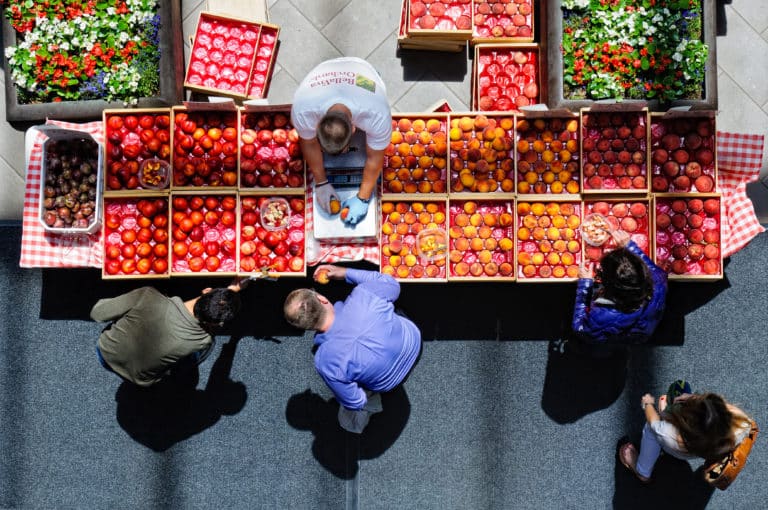
Image by Brandon Doran/Flickr, Attribution-NonCommercial-NoDerivs.
Small Is Still Beautiful
What makes an economy stable?
It’s a question that’s preoccupied academics and financial experts since that oft-quoted Scotsman Adam Smith. There are a lot of answers, but none of them are particularly simple. The official one is some variant on this:
“Economic stability refers to an absence of excessive fluctuations in the macroeconomy. An economy with fairly constant output growth and low and stable inflation would be considered economically stable.”
As Americans continue to climb their way back from the nosedive that started in 2008, we’d be wise to think twice before putting our faith in rebuilding the very institutions and cultural mythologies that were, at least in part, responsible for getting us in so much trouble in the first place. For all of globalization’s gifts — an increased sense of empathy for those on the other side of the world, being my personal favorite — one of the burdens has been feeling entangled in an economic web so vast, so intricate, that making smart, moral choices feels next to impossible. You read about the environmental plunder and exploitation happening in Congo, but then struggle to find a conflict-free phone. You don’t want to buy clothes made in sweatshops, but then you hear that you might be empathizing people right out of jobs in the Global South who would rather be vastly underpaid in dangerous factories than have no livelihood at all. It all feels so distant and so complex.
What if one of the virtues for a stable economy wasn’t scale, but its opposite? What if the safest thing we could possibly do is invest in the people and places within walking distance of us?

That’s the worldview of a whole variety of really interesting people these days, including 35-year-old Janelle Orsi, the co-founder of the Sustainable Economies Law Center and the author of Practicing Law in the Sharing Economy. When Janelle graduated from UC Berkeley Law School in 2008, she started showing up at events around town and introducing herself like this: “I’m a lawyer and my goal is to help people share.”
“People would give me very funny looks,” she admits. “A lot of them actually thought I was joking.”
But then the economic realities started to set in and more and more people started to get hip to what is called the “sharing economy.” Janelle’s version is less Uber and more City CarShare, less Airbnb and more co-housing. In other words, the organizations she’s trying to encourage and support are not designed to serve the masses, but to serve particular communities.
In many ways, Janelle is beating an old drum. In E. F. Schumacher’s Small Is Beautiful: A Study of Economics As If People Mattered, published in 1973, he argued that smaller, localized economies were not only environmentally superior, but socially and morally superior, too. He wrote:
“If human vices such as greed and envy are systematically cultivated, the inevitable result is nothing less than a collapse of intelligence. A man driven by greed or envy loses the power of seeing things as they really are, of seeing things in their roundness and wholeness, and his very successes become failures. If whole societies become infected by these vices, they may indeed achieve astonishing things but they become increasingly incapable of solving the most elementary problems of everyday existence.”
In other words, as we worship at the altar of scale — big companies, big ideas, big solutions — we conflate size with worthiness. We begin to see every problem, even the most personal, as something that can be solved by a large market, an abstract idea, a person whom we will never meet. In this way, we grow dumb about the power of the people in our own backyard, dumb about how to make basic, meaningful things like food and shelter, dumb about small.
Janelle is wise about small. In fact, she spends her days thinking about all of the ways we can navigate around, subvert, and change the laws that inhibit us from “solving the most elementary problems of everyday existence,” i.e. create worker-owned businesses and other resilient and radical kinds of community organizations. (She also spends her days sketching out her ideas, as she’s literally the “cartoonist-in-chief.”)

Many of the laws that were originally created to protect consumers from big companies actually prevent small-scale entrepreneurs — people who, for example, make granola or bread in their home kitchens and sell at farmer’s markets — from doing the most natural thing in the world: serving hungry folks in their own communities.
In this case, Janelle and her dozen co-workers at The Sustainable Economies Law Center were able to pass The California Homemade Food Act in 2012. The law allows people to create home-based food businesses when they’re creating food that’s not seen as high risk (usually doesn’t require refrigeration) and make less than ,000 a year. In an otherwise pathetically partisan climate, it’s an idea that people on both sides of the aisle get behind. “It’s the kind of bill that Republicans loved because it’s pro-business and a little bit anti-regulation,” Janelle explains. “But Democrats also are into it because it expands economic opportunities for people who have been marginalized in our current economy.”
E.F. Schumacher died just three years after writing Small Is Beautiful, but I think he would be jumping up and down with delight to know about Janelle and her work in the world. She’s evidence that small is still beautiful.

Share your reflection